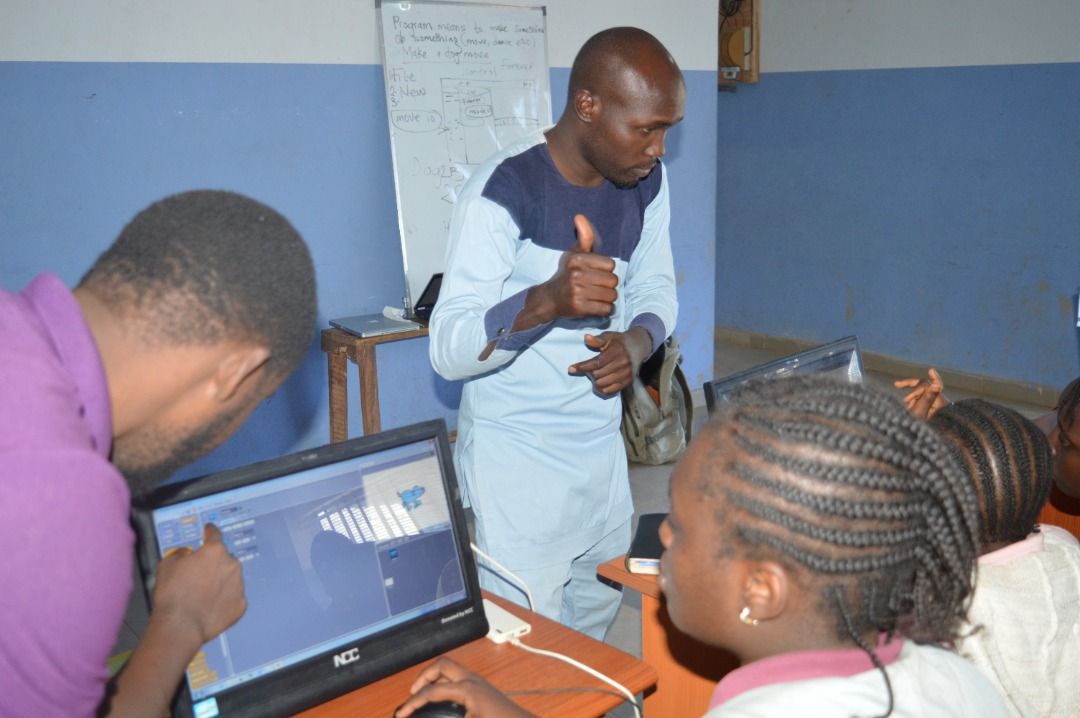Deaf Tech Foundation is teaching programming to deaf kids in Northern Nigeria, for free
Mercy, a 10-year-old Deaf kid living in Northern Nigeria, had to pause schooling for five years due to her condition. The Deaf Tech Foundation is changing this trend for people like her.

The Deaf Technology Foundation (DTF) is driving diversity, and inclusion in Northern Nigeria by offering free programming training to kids.
According to a report by SAGE Journals, 23.7% of Nigerians have a hearing impairment (total deafness, hearing loss, or other hearing-related impairment) in a country of more than 155 million people.
Since October 2017, the Deaf Technology Foundation (DTF) has been offering free programming and robotics training to kids (aged 5 to 12 years) in the Northern region of Nigeria.
Meet Mercy Samson, a 17-year old. Mercy became deaf at the age of 5 due to a medical condition, as a result of this, she stayed away from formal education for five years. Until 2017, when Mercy joined DTF, she had never used a computer. "When I joined the foundation, I was trained on the basics of computer operations, it was here that I started learning how to use the mouse, now I can do a lot with the computer", she told benjamindada.com.
Currently, Mercy is quite proficient at programming, web development and animations. During the COVID-19 pandemic lockdown, she built an automatic hand sanitizer and dispenser using an ultra-sonic sensor to detect the distance between the hand and the sanitizer. She is one of more than 900 students trained at the foundation funded by donations from friends, families and other partnerships.
Like Mercy, the students have learnt and are learning the basics of programming and robotics, some of them have developed games and sign language tutors using scratch, a Q&A android app and they have also built and programmed autonomous robots and smart homes using Arduino. In 2018, they were a part of the Indigitous Hackathon and the 2019 MakeX National Robotics Competition.
"With this exposure, I have now seen my relevance in the communities, I and other graduates from the programme served as trainers for hearing impaired students at Plateau School of the Deaf", says Mercy.
Note: All of Mercy's communication to us was done via sign language and interpreted to us.
"Lack of Funds" amongst other challenges...
In 2018, Nenmeemwa Goshit volunteered as an Interpreter at the Foundation, currently, she is the Head of Interpreters and Inclusive Design. According to her, access to funds is the major challenge they are experiencing in the community. "These kids do not have personal computers to practice with and our kits are not sufficient, we often dismantle the prototypes created by the students because of our inability to access funds. Most parents do not want to get involved in the growth of these children.", Nenmeemwa tells us. "The current space we are using for our coding club is becoming insufficient so we are looking at other alternatives".
As part of their prospects, DTF also wants to get involved in making inclusive decisions that will create access for deaf kids. Currently, deaf kids on the Plateau are not admitted to reading STEM-related courses in both secondary and tertiary institutions.
Recently, the co-Founder and Director of the Deaf Tech Foundation, Wuni Bitrus was named as one of the top 100 CTO/CIOs in the world who are promoting diversity in Tech by the National Diversity Council USA. In July 2021, the foundation and other 41 organizations around the world got a partnership with the Massachusetts Institute of Technology (MIT) to participate in Scratch Educative Collaborative that will enable deaf kids in the ecosystem to have exclusive access to Scratch features.
In a separate interview, Wuni said, "we need to listen to the Deaf and other groups of people’s living with disabilities. When we truly pause and listen to them and see them, then we can all play our parts to make the world a more level playing ground for them".







Comments ()